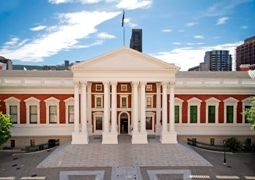
The National Council of Provinces (NCOP) invited cabinet ministers, academics and experts in the field of local government, to a virtual workshop on cooperative governance and intergovernmental relations. The theme of the two-day event was Taking a Lead in Advancing Co-operative Governance and Intergovernmental Relations.
Delivering the opening remarks and welcoming guests to the virtual workshop, the Chairperson of NCOP, Mr Amos Masondo, spoke on the role of the NCOP in advancing co-operative governance and intergovernmental relations. He referred to the Constitution, which states that the NCOP represents the provinces to ensure that provincial interests are considered in the national sphere of government, and that it does this primarily by participating in the national legislative process and providing a national forum for public consideration of issues affecting the provinces.
“The Constitution heightens the role of the NCOP in society by providing space for part-time representatives to represent the different categories of municipalities in this House. This makes it the only structure in our Parliament that is constitutionally mandated to bring together under one roof the public representatives from the three spheres of government.
“Owing to this constitutional design, it is expected of the NCOP to take a lead in advancing the principles of cooperative government and intergovernmental relations. These principles are contained in chapter 3 of the Constitution”, said Mr Masondo.
The NCOP Chairperson also highlighted that the NCOP can contribute to the building of effective, integrated and resilient planning and service delivery systems, because it can “draw provincial and local experiences into the national debate when the effectiveness of policy and its implementation is considered”.
“As an oversight body, the NCOP is at a vantage position to contribute to the realisation of this constitutionally mandated form of governance towards achieving the desired policy outcomes for the transformation of our society,” he added.
Minister of Cooperative Governance and Traditional Affairs Dr Nkosazana Dlamini-Zuma delivered the keynote address, and commended the NCOP for organising the workshop, which she said will empower the delegates of the NCOP with a better understanding of the fundamental legislative and policy precepts governing cooperative governance and intergovernmental relations in South Africa.
“It is also intended to create a platform to share knowledge and information on current developments and best practices on cooperative governance and intergovernmental relations for effective governance and coherent service delivery to communities. Thus, having just emerged from our sixth peaceful democratic local government elections, this type of session also offers us an opportunity to provide a frank and honest reflection on the regrettable situation in the political landscape as well as the state of governance and intergovernmental relations in our country,” she said.
The Minister also spoke at length about the importance of coordination between the three spheres of government for better service delivery, and those public representatives must be servants of the people.
She raised concerns about the overlapping mandates, functions, and expectations of provincial COGTA departments and the Offices of the Premiers, especially in relation to municipalities and intergovernmental relations. “This is a matter we intend to pay greater attention to as we undertake the 21-year review of local government, in which we hope Parliament will be an active participant”, the Minister said.
Dr Dlamini-Zuma added that the decay of municipalities and governance in some of the provinces and municipalities has built up over the years, if not decades. Even though some municipalities may receive more favourable audit outcomes, the internal workings favour some with consequence management not applied or with some workers victimised for either being diligent or blowing the whistle.
“Recent research by the Public Services Commission and the Human Sciences Research Council comes to the startling conclusion that the public service is not bloated, but that there is a lack of full utilisation of the human resource capacity within the public services due to the misalignment of skills, long suspensions and victimisation,” she said.
The Chairperson of the Municipal Demarcation Board, Mr Thabo Manyoni, said: “Coordinated efforts, if that’s what inter-governmental relations is about, are important and necessary to build the country”.
Closing the proceedings, the Chief Whip of the NCOP, Mr Seiso Mohai, commended the presentations, saying they were well-researched and will serve as reference in the work of the NCOP.
Sakhile Mokoena
1 February 2022

